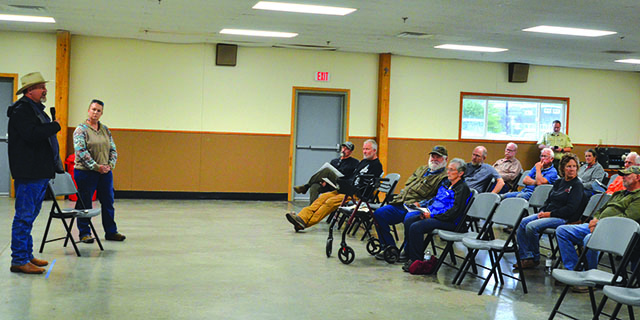Commissioners flustered with Legislature
Published 7:00 am Wednesday, March 9, 2022

- From left, Wallowa County Commissioners John Hillock and Susan Roberts listen as Todd Nash speaks Wednesday, March 2, 2022, during their regular meeting. The commissioners were disappointed in the Oregon Legislature’s actions that were detrimental to rural counties.
ENTERPRISE — Disappointment over Oregon’s rural-urban divide was the order of the day Wednesday, March 2, as the Wallowa County Board of Commissioners reviewed the legislative session that was about to conclude last week.
“Well, the (legislative) session’s winding down and, as usual, we lost just about everything we were going for strongly,” Commissioner Todd Nash said in a review largely for the audience.
Trending
Ag overtime
In noting the impending passage of the ag overtime bill, he commended state Rep. Bobby Levy for her efforts to see it stopped.
“Rep. (Bobby) Levy gave one of the top three impassioned efforts to sway the overtime (bill), but failed in that,” Nash said. “We have pushed really hard to get an exemption for livestock. Livestock don’t know the constraints of time and the industry, in general, has some extremely long hours, but in a lot of cases it’s a lifestyle rather than a job. It’s very hard to convey that to people who don’t understand the industry and don’t understand that recreation and family and everything else overlaps and the amount of money that’s actually available for employment and the compensation, whether it’s through a half a beef or allowing them to keep their dogs or horses there or pay their vet bills or sometimes gasoline or sometimes housing doesn’t comport with them. They don’t understand. It didn’t matter that the competitive nature of trying to maintain and retain employees is extremely hard. So that’s going to go through and it’s just more of a detachment in the rural-urban divide. It’s very disappointing for a lot of folks.”
Commission Chairwoman Susan Roberts agreed.
“The sad thing is in listening to the testimony, you have lots of producers who hire these folks that will, those folks depend on that overtime to make up that income,” she said. “They’re OK with six days a week or so. Now we’re going to limit them to 40 hours and that’s all you get. It’s going to harden their lives.”
“And it causes people to, rather than getting an hourly wage or a salary, it causes them to start another enterprise, so they’re hiring them on the hay side or on the fencing side,” Nash said. “It puts people in a position of doing things they wouldn’t have done otherwise to try to accommodate some of that. There’s ways to get around it.”
Trending
Wolf compensation
Nash noted another loss for rural communities — a bill aimed at compensating livestock producers for wolf predation.
“The wolf compensation, we lost on as well,” he said. “Millions of dollars were distributed throughout the state. We had substantial losses this year, more than ever across the state, and Wallowa County was no exception. The really illegitimate environmental community that has no impact whatsoever stood up once again and opposed this and our liberal, downtown Portland legislators bought into it and opposed it and at the end of the day we didn’t get funded on that.”
Nash saw that as a prime example of the rural-urban divide.
“Wolf compensation was one of those that a Democrat from Portland said, ‘No, I don’t want that.’ And it got taken off,” he said.
Roberts reminded Nash of another loss to rural communities.
“There was another one that you missed — OSU Extension,” she said of Oregon State University.
“That was a huge one,” Nash agreed. “It got nothing.”
Roberts said those kinds of things happen because the Democrats — the largely urban party — dominate the Legislature and thus hold the chairmanships on most committees.
“If they don’t want to hear it, they don’t,” she said. “It’s statewide and it’s very frustrating. They live on the other side of the state and they think that we’re stupid because we choose to live out here in the sticks, even though we try and impress upon them we’re not as stupid as they might think. We like it out here in the sticks. We could go on forever.”
Commissioner John Hillock agreed.
“Even though in Portland they talk about the urban-rural divide, it’s a bigger deal than what you might think,” he said. “We were at one meeting when I was going to commissioners’ college and one lady asked if we had libraries out here. I had to go cool off a commissioner from one county because he was about to blow a cork. That’s the mentality you get. … My response to her was, ‘And guess what, we have internet, too.’ She didn’t think we had internet.”
“And dishwashers, occasionally,” Roberts laughed. “The bottom line is that it’s sad that our body politic that our Founding Fathers set up for us has devolved to this what it is today.”
Other business
In other business, the commissioners:
• Scheduled two public hearings on road vacations at Wallowa Lake for April 6. At 10 a.m. will be a hearing for the vacation of a portion of Pollock Road requested by Dale Mammon. At 10:30 a.m. will be a hearing for the vacation of a portion of Hamilton Road requested by David Graham.
• Accepted the retirement and rehired on an hourly basis Grants Manager Chrystal Allen. Roberts said Allen retired Feb. 28 and will be available to help train her replacement.
• Hired Harold D. Black in the Planning Department on an on-call basis. He previously had been a part-time employee.
• Approved resolutions appointing Brenda Micka as budget officer for the county and for the Wallowa Lake County Service District.
• Appointed three members to the county Compensation Board.









